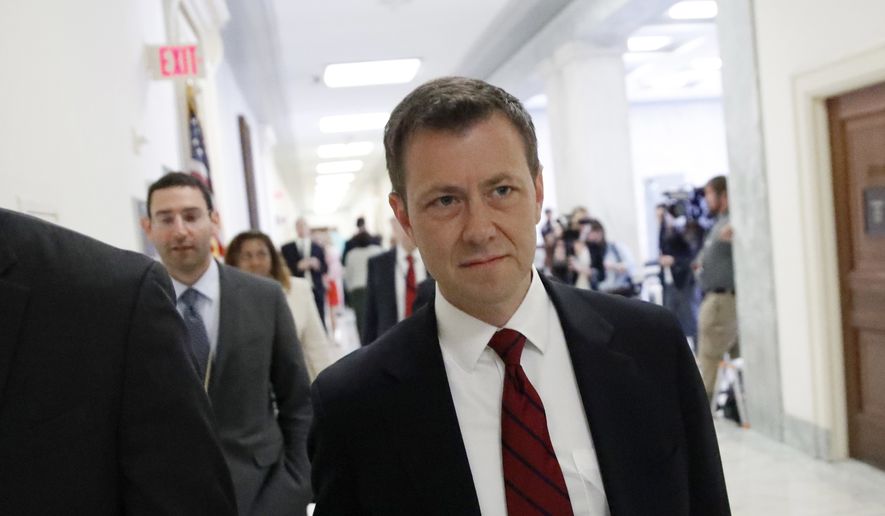The FBI agent whose anti-Trump texts raised questions about political bias in the special counsel’s Russia probe told lawmakers on Wednesday he regretted his actions, but denied that his political views influenced the investigation.
Peter Strzok addressed lawmakers’ questions in an 11-hour closed deposition before the House Judiciary and House Intelligence committees. Neither Mr. Strzok nor his attorney spoke to reporters Wednesday afternoon as they left the hearing, but two lawmakers offered small glimpses into his testimony.
“Just an intimate conversation between intimate friends,” said Rep. Sheila Jackson Lee, Texas Democrat, quoting Mr. Strzok’s account of his text message exchange with Lisa Page, an FBI attorney with whom he was having an extramarital affair.
In the text exchanges, Mr. Strzok and Ms. Page disparaged the president, using terms like “loathsome” and “an idiot.” The most troubling exchange came just before the election when Ms. Page expressed concern that President Trump might when the election and Mr. Strzok responded that “we’ll stop it.”
Mr. Strzok was quietly removed from special counsel Robert Mueller’s team last year after Justice Department Inspector General Michael E. Horowitz discovered the text exchanges. Mr. Strzok also was one of the leading agents probing Hillary Clinton’s use of a private email server when she was secretary of state.
Earlier this month, Mr. Strzok was escorted out of the FBI building and stripped of his security clearance. Ms. Page has since left the bureau of her own accord.
SEE ALSO: Donald Trump: Peter Strzok given ‘poor marks’ on testimony
Ms. Jackson Lee said she believed Mr. Strzok’s claims that his messages did not mean there was political bias in his work and that he now regrets the exchanges.
But Mark Meadows, North Carolina Republican, said none of his political bias concerns were alleviated by Mr. Strzok’s testimony.
“If you have intimate personal conversations between two people, that normally would show the intent more so than perhaps something that would be said out in public,” Mr. Meadows told reporters.
Mr. Meadows said lawmakers questioned the FBI agent about the genesis of the Russia investigation and the surveillance of Trump campaign associates in 2016.
Ranking Democrats on the Judiciary and Oversight committees described Wednesday’s deposition “desperation” by Republicans to impugn Mr. Mueller’s investigation.
Reps. Jerrold Nadler of New York and Elijah Cummings of Maryland said in a statement Mr. Strozk’s alleged bias did not influence the Clinton investigation or the Russia probe.
“House Republicans are desperately trying to find something — anything — to undermine Special Counsel Mueller’s investigation of the Trump campaign,” they said. “Unfortunately for them, they were entirely unsuccessful today, and their interview of Mr. Strzok will not help their misguided mission.”
Both Mr. Nadler and Mr. Cummings called on the committee chairman to release a transcript of Mr. Strzok’s testimony.
Republicans have pushed for more information about whether Mr. Strzok and Ms. Page played a role in getting the Russia collusion probe under way.
Sen. Lindsey Graham on Tuesday sent a letter to Deputy Attorney General Rod Rosenstein demanding to know whether Mr. Strzok or Ms. Page were responsible for the FBI’s use of a confidential informant to make contact with Trump campaign officials.
The two “exchanged message after message showing extreme bias against Donald Trump and a willingness to use their positions at FBI to ensure that he not get elected,” Mr. Graham wrote. “While I am sensitive to the idea that Congressional oversight must be tempered when it involves ongoing investigations, there comes a point when the public’s right to be informed of a corrupt investigation wins the day.”
Mr. Graham asked Mr. Rosenstein whether Mr. Strzok and Ms. Page supervised or directed the source who made contact with Trump campaign aide Carter Page.
Earlier this month, Mr. Horowitz recommended the FBI take administrative action against Mr. Strzok, Ms. Page and three other unnamed individuals in the bureau for their political biases against President Trump.
“The damage caused by [Mr. Strzok and Ms. Page’s] actions extends far beyond the scope of the [Clinton email] investigation and goes to the heart of the FBI’s reputation for neutral fact finding and political independence,” Mr. Horowitz said in the report.
But Mr. Horowitz did not say whether Mr. Strzok’s bias influenced the Russia investigation.
Testifying before Congress two weeks ago, Mr. Horowitz was asked about Mr. Strzok’s texts, and replied “I think as we found it clearly shows a biased state of mind.”
• Jeff Mordock can be reached at jmordock@washingtontimes.com.




Please read our comment policy before commenting.